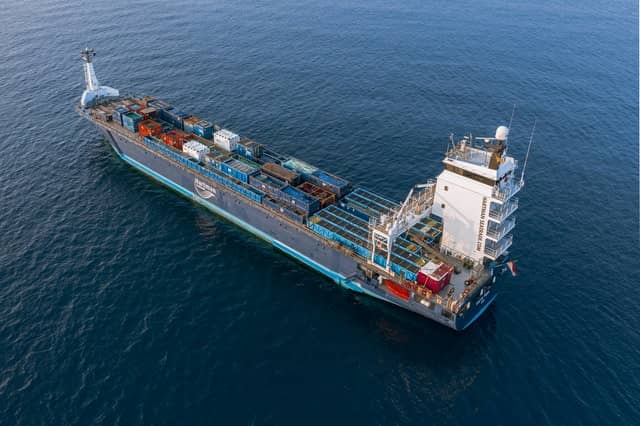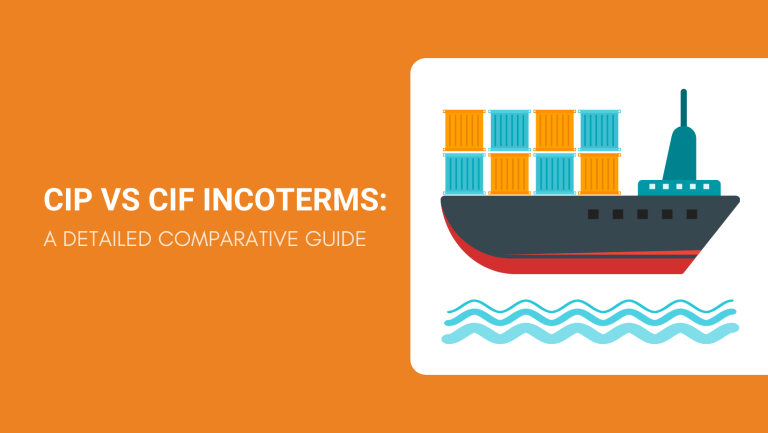Shipping Incoterms offer great guidance on how sellers and buyers should share responsibilities during the transfer of goods. However, because shipping procedures are so similar, some Incoterms can be difficult to differentiate.
CIP and CIF are apt examples of Incoterms that can be difficult to choose between. They bear lots of similarities but at the same time, they are not identical. So, how do you know when to choose one over another?
In this comparative blog, we evaluate CIP vs CIF Incoterms, their pros, cons, differences, and similarities. By the end of it, you will likely know exactly which of them is the right pick for your shipping needs.
Shall we begin?

CIP vs CIF Meaning
CIP stands for ‘Carriage and Insurance Paid’. It is a shipping term where a seller is responsible for the insurance and transportation costs of transferring goods from their premises to a location agreed upon with the buyer.
On the other hand, CIF stands for ‘Cost Insurance, and Freight’. Under these shipping terms, the seller is also tasked with paying and arranging for the insurance and transportation of goods from their warehouse to a nominated destination.
However, in CIF, the word ‘Freight’ is used to specify the fact that this shipping term is restricted to sea or ocean transportation. This is unlike in CIP where the term ‘Carriage’ is general and thus makes the shipping Incoterm ideal for all modes of transport.
For clarity, let us first examine these shipping terms individually before comparing them.
Carriage and Insurance Paid (CIP)
When you and your seller agree to CIP Incoterms, you will need to nominate a destination for delivery. It can either be the port of entry in your country, your warehouse, or any other location that both parties agree on.
This is defined to guide the seller as they arrange transit insurance and transportation.

The Seller’s Responsibilities
CIP Incoterms rules then oblige the seller to:
- Pack the goods in export-worthy packaging
- Organize insurance for the goods for the entire duration of transit
- Load the goods onto a local carrier
- Transport the goods to the export carrier
- Clear the goods for export and pay for export clearance fees
- Pay for terminal handling charges
- Liaise with the export carrier to get shipping documents such as a Bill of Lading or an onboard notification
- Share the documents with you (the buyer) to make it possible for you to claim the goods
In some cases, more than one carrier may be required to get the goods from the export country to the nominated location. Under CIP Incoterms it is the seller’s responsibility to pay all the carriers unless otherwise negotiated.
The transit insurance of the goods should also cover all the different modes of transport that are used in such a process.
Further, the risk of the goods shifts from the seller to the buyer once the seller delivers the goods to the first export carrier. If any loss or damage to the goods occurs after the delivery, you(the buyer) can only claim compensation from the insurer.
The Buyer’s Responsibilities
Once the goods arrive at the nominated destination, it is the buyer’s responsibility to:
- Organize the unloading of the goods (if the export carriage contract does not include unloading services).
- Pay for terminal handling charges
- Clear the goods through customs and pay for any import clearance fees that may arise
- Coordinate and pay for last-mile delivery of the goods to their preferred location
Advantages of CIP Incoterms

Advantages to the buyer:
- You would not have to endure the challenges of organizing shipping or insurance from the export country because the seller handles it all.
- The provision of insurance protects you from any potential losses that could arise from pilferage or damage to goods during transit.
- You can use CIP shipping terms for different modes of transport or even in situations where you need multiple carriers during one delivery leg.
Advantages to the seller:
- CIP rules allow sellers to choose a carrier and insurer that fits their budget preferences; they can, therefore, balance their cost and profit margins.
- CIP shipping makes it easy for a seller to obtain shipping documents which are often important for proof of delivery and claiming payment.
- A seller working under CIP rules does not have to worry about coordinating clearances and delivery at the port of destination.
Disadvantages of CIP Incoterms
Disadvantages to the Buyer:
- Sometimes sellers do not always choose the most effective shipping carrier or insurer. Yet, you often have little if any say on their choices.
- If any of your goods are lost or damaged, it is your responsibility to pursue compensation with the insurer. The seller is absolved of risk once they deliver the goods to the carrier.
- Sellers often transfer the costs they incur for transport and insurance to you through the prices they charge for the goods.
Disadvantages to the seller:
- It can be difficult to coordinate CIP shipping where more than one carrier is involved.
- Insurance premiums can be high under CIP depending on different factors like the type or number of carriers.
Cost Insurance and Freight (CIF)
CIF Incoterms are restricted to sea/ocean freight. As a result, you and your seller would have to specifically agree on a port where your goods are to be delivered. Once that is sorted out, each of you can begin executing your roles as below.
The Seller’s Responsibilities

After the seller prepares the goods according to your order, CIF rules mandate them to:
- Pack the goods in export packaging that is suitable for sea shipping
- Arrange for transit insurance for the goods from their warehouse to the nominated port
- Load the goods onto a local carrier and transport them to the export carrier
- Clear the goods for export and pay the export clearance fees
- Pay for terminal handling fees
- Obtain pertinent shipping documents
- Share the shipping documents with the buyer
The responsibility of the goods shifts from the seller to the buyer once the goods are delivered to the export carrier.
The Buyer’s Responsibilities
When the goods arrive at the buyer’s nominated port, they are tasked with:
- Organizing the unloading of the goods
- Clearing the goods through customs
- Paying the terminal handling charges
- Clearing the goods through customs and paying any import duties that arise
- Coordinating and paying for last-mile delivery of the goods to their preferred location
Advantages of CIF Incoterms

Advantages to the buyer:
- The seller bears all the responsibilities of arranging transport and insurance from the export country.
- You do not have to worry about dealing with export clearances in a foreign country because the buyer handles all export processes.
Advantages to the seller:
- CIF insurance premiums are usually lower than CIP premiums.
- Only one carrier can be used under CIF rules and thus it is easier and more cost-effective.
- Under CIF, sellers get to choose the carriage and insurance providers and negotiate contracts to their advantage.
Disadvantages of CIF Incoterms
Disadvantages to the buyer:
- The seller’s choice of carrier or insurer may not always be to your liking.
- The costs the seller incurs often end up in the prices that you pay for the goods.
- Sea/ocean freight usually presents a higher risk to goods compared to other modes of shipping. Yet, CIF Incoterms only require the seller to provide minimal insurance.
- CIF limits you to only one mode of transport. Subsequently, if you need to use other means during high shipping seasons or for urgent orders, you would need to negotiate new shipping terms.
Disadvantages to the seller:
- It can be difficult and costly to arrange sea/ocean freight during times like the Q4 dropshipping window due to the high volumes of goods shipped at that time.
- Factors like a Letter of Credit can restrict the carrier and insurance providers that a seller can use.
CIP Incoterms and CIF Incoterms Compared
As you may have gleaned from the individual analysis of CIP and CIF Incoterms, their differences are subtle but impactful. Here is a comparison of some key factors that could help you identify which of them is ideal for your business.
Stipulated Modes of Transport

CIP Incoterms provide flexibility when it comes to modes of transport. They allow you to ship goods via air, road, rail, sea, or even combine multiple types of transport. CIF Incoterms, however, only cover shipping via sea/ocean or inland waterways.
Shipping flexibility makes it easy to transition from one mode of transport to another without having to renegotiate shipping terms with your supplier or alter your sales contract.
CIP shipping may, therefore, be the superior option in this regard. Unless of course, the goods you are sourcing can only be shipped by water and you thus have no use for other modes of export transport.
Insurance
Incoterms 2020 stipulate that sellers shipping under CIP rules should insure the goods for at least 110% of the worth of the contract.
In contrast, under CIF rules, a seller is only required to provide marine insurance of a minimal value. This amount is often negotiable but because it is not clearly stated, you would mostly be relying on your ability to negotiate and the magnanimity of your seller.
Based on these details, CIP Incoterms offer better protection against shipping liabilities than CIF Incoterms. True, you may incur higher costs under CIP but you are more assured that if anything goes wrong, you will be fully compensated by the insurer.
Types of Cargo
When it comes to shipping cargo, it is important to consider factors such as:
- The value of the cargo
- The size of the cargo or the amount of space required to ship it
- The nature of the cargo I.e is it fragile, listed as an air transport hazard, or perishable?
CIP shipping is recommended for high-value goods. This is mostly due to the higher level of insurance coverage stipulated under its rules.
CIP is equally ideal if you ship varying sizes of cargo like in dropshipping fulfillment where each order is unique. This is because you can use different methods of transport for fulfillment.

On the other hand, CIF shipping is recommended for low-value goods due to its low insurance protection. It is also suitable for bulk cargo through FCL or LCL shipping. This is because CIF is tied to ocean freight which is very affordable for bulk shipments.
FAQs on CIP vs CIF Incoterms
Which Is Better: CIP or CIF Incoterms?
There is no specific set of shipping Incoterms that is best for all situations. As we have alluded to above, it is crucial to evaluate your shipping situation and:
- Negotiate with your seller and be clear about what they are offering
- Consider the type of cargo you are shipping
- Consider the nominated destination as well as the modes of transport that are needed to get the goods there
Nevertheless, CIP Incoterms offer everything that CIF Incoterms offer. The seller will pay for transport, insurance, and you can use different means of transport including ocean freight. Moreover, CIP provides better insurance which is always safer even if it is pricey.
What Is the Difference Between CIP and CIF Incoterms?
CIP and CIF Incoterms have the following differences:
- Sellers under CIP are required to provide a 110% insurance cover while CIF only a minimal insurance cover is required.
- CIP Incoterms can be used for all means of transit but CIF Incoterms are only for sea/ocean freight.
- CIP Incoterms make the seller liable to pay for carriage to the nominated destination which can be a port or inland location. CIF Incoterms only require the seller to pay for transport to the port of destination.
How Do CIP and CIF Incoterms Compare to Other Shipping Incoterms?
CIP and CIF Incoterms are the only shipping Incoterms where a seller is mandated to pay for the insurance of the goods in transit. Subsequently, they are the ideal option if you would prefer the seller to handle that particular responsibility.
In terms of delivery, CIP and CIF provide a reasonable sharing of costs and responsibilities between sellers and buyers. Other shipping Incoterms like EXW, FCA, FAS, or FOB leave most of the responsibilities to the buyer and can be tough for beginners.
However, if you would like the seller to bear even more responsibility, Incoterms like DAP or DDP may be more ideal. They mandate the seller to handle most costs and responsibilities at both the country of origin and the country of import.
To Sum It Up
CIP Incoterms are recommendable for high-value goods or shipping arrangements where you would prefer a high insurance cover and flexible transport options.
CIF Incoterms, on the other hand, are suitable for bulk cargo or cargo that specifically requires to be shipped via sea/ocean freight. Make an effort, however, to negotiate a fair insurance cover with your seller just in case there are any shipping mishaps.
That said, at NicheSources, we understand how complicated shipping agreements can be and that not all suppliers negotiate in good faith. As such, we have tailored our product sourcing and global shipping services to focus on your interests as a buyer.
Simply send us a request outlining your sourcing and shipping requirements and ask for a free quote. We will liaise and negotiate within our networks to find you the best possible solultions.

